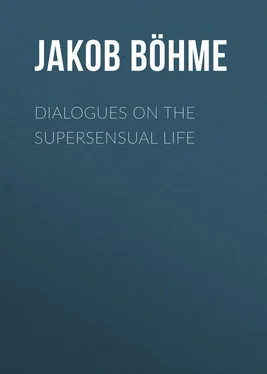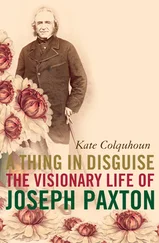Jakob Böhme - Dialogues on the Supersensual Life
Здесь есть возможность читать онлайн «Jakob Böhme - Dialogues on the Supersensual Life» — ознакомительный отрывок электронной книги совершенно бесплатно, а после прочтения отрывка купить полную версию. В некоторых случаях можно слушать аудио, скачать через торрент в формате fb2 и присутствует краткое содержание. ISBN: , Жанр: foreign_antique, foreign_prose, на английском языке. Описание произведения, (предисловие) а так же отзывы посетителей доступны на портале библиотеки ЛибКат.
- Название:Dialogues on the Supersensual Life
- Автор:
- Жанр:
- Год:неизвестен
- ISBN:http://www.gutenberg.org/ebooks/33742
- Рейтинг книги:4 / 5. Голосов: 1
-
Избранное:Добавить в избранное
- Отзывы:
-
Ваша оценка:
- 80
- 1
- 2
- 3
- 4
- 5
Dialogues on the Supersensual Life: краткое содержание, описание и аннотация
Предлагаем к чтению аннотацию, описание, краткое содержание или предисловие (зависит от того, что написал сам автор книги «Dialogues on the Supersensual Life»). Если вы не нашли необходимую информацию о книге — напишите в комментариях, мы постараемся отыскать её.
Dialogues on the Supersensual Life — читать онлайн ознакомительный отрывок
Ниже представлен текст книги, разбитый по страницам. Система сохранения места последней прочитанной страницы, позволяет с удобством читать онлайн бесплатно книгу «Dialogues on the Supersensual Life», без необходимости каждый раз заново искать на чём Вы остановились. Поставьте закладку, и сможете в любой момент перейти на страницу, на которой закончили чтение.
Интервал:
Закладка:
"Man has a spark of the Light and Spirit of God, as a supernatural gift of God given into the birth of his Soul to bring forth by degrees a new birth of that life which was lost in Paradise. This holy spark of the Divine Nature within him has a natural, strong, and almost infinite tendency or reaching after that eternal Light and Spirit of God, from whence it came forth. It came forth from God, it came out of God, it partaketh of the Divine Nature, and therefore it is always in a state of tendency and return to God. All this is called the breathing, the moving, the quickening of the Holy Spirit within us, which are so many operations of this spark of life tending towards God. On the other hand the Deity as considered in itself, and without the Soul of man, has an infinite unchangeable tendency of love and desire towards the Soul of man, to unite and communicate its own riches and glories to it, just as the Spirit of the air without Man unites and communicates its riches and virtues to the Spirit of the air that is within Man. This love or desire of God toward the soul of Man is so great that he gave his only-begotten Son, the brightness of his glory, to take the human nature upon him, in its fallen state, that by this mysterious union of God and Man, all the enemies of the Soul of Man might be overcome, and every human creature might have a power of being born again according to that Image of God in which he was first created. The gospel is the history of this Love of God to Man. Inwardly he has a seed of the Divine Life given into the birth of his Soul, a seed that has all the riches of eternity in it, and is always wanting to come to the birth in him, and be alive in God. Outwardly he has Jesus Christ, who as a Sun of Righteousness, is always casting forth his enlivening beams on this inward seed, to kindle and call it forth to the birth, doing that to this Seed of Heaven in Man, which the sun in the firmament is always doing to the vegetable seeds in the earth.
"Consider this matter in the following similitude. A grain of wheat has the air and light of this world enclosed or incorporated in it. This is the mystery of its life, this is its power of growing, by this it has a strong continual tendency of uniting again with that ocean of light and air from whence it came forth. On the other hand that great ocean of light and air, having its own offspring hidden in the heart of the grain has a perpetual strong tendency to unite and communicate with it again. From this desire of union on both sides , the vegetable life arises and all the virtues and powers contained in it. But let it be well observed that this desire on both sides cannot have its effect till the husk and gross part of the grain falls into a state of corruption and death; till this begins, the mystery of life hidden in it cannot come forth."
The sun only acts by stirring up in each thing, and calling into activity, its own imprisoned, dormant, heat or life. Save by the same nature-process, working in an inner sphere, there cannot come to pass the flower and fruit of the Soul. The Sun, true emblem of the Redeeming Spirit, helps each vital force to break forth from its state of death – even though, like the grains of wheat found in Egyptian graves and then new-planted, it has[Pg xxviii] been immured there thousands of years – and to enter into its highest possible state of life. Indeed, in this school of wisdom, the natural visible light, of which the Sun is the dispensing medium to our solar system, and other suns to other circles of planets, is actually an outer manifestation of the inner supernatural light, and warmth, not a mere emblem at all. We speak more truly than we know, when we speak of a "heavenly day." All Nature is a series of "out-births" of the Deity. "The outward world," says Behmen, "is sprung out of the inward spiritual world, viz., out of Light and Darkness." And his English interpreter says: "Whatever is delightful and ravishing, sublime and glorious in spirits, minds, or bodies, either in heaven, or on earth, is from the power of the Supernatural Light opening its endless wonders in them. Hell has no misery, horror or distraction, but because it has no communication with the supernatural Light. And did not the supernatural Light stream forth its blessings into this world, through the materiality of the Sun, all outward Nature would be full of the horror of Hell." And elsewhere, "There is no meekness, benevolence or goodness in Angel, Man, or any other Creature , but where Light is the Lord of its life. Life itself begins no sooner, rises no higher, has no other glory, than as the Light begins it, and leads it on. Sounds have no softness, flowers and germs no sweetness, plants and fruits have no growth, but as the Mystery of Light opens itself in them." 6 6 Law's Works, vol. viii., p. 189.
And so Behmen himself says: "There is nothing that is created or born in Nature but it also manifests its internal form externally; for the internal continually labours or works itself forth to manifestation. We know in the power and form of this World, how the only Essence has manifested itself with the external birth in the desire of the similitude; how it has manifested itself in so many forms and shapes, which we see and know in the stars and elements, likewise in the living creatures, and also in the trees and herbs." Thus there is a real communion between all beauty, sweetness, and glory, within and without the Soul of man.
It is this truth, not of the analogy between the essential life of Man and Nature, but of the unity in all things, that is now opening itself out in many ways. Wordsworth, a true seer, has given to it its highest expression in English Poetry. Modern science all tends to confirmation of this unity.
God, then, must become Man, there must be a birth of the Life of God in the Soul, in order that the Soul may live its highest life. Only in this way can the wild properties of Nature be subordinated and turned to their proper use, their restless hunger pacified. Goodness and happiness can be expected from nothing else but from the Divine Life united to and dwelling in the Nature Life. It is the "ingrafted Word" of St James' Epistle.
The plant cannot but grow towards the sun. If it is too deep in earth, or prevented by a strong soil, or withered by dryness, so that it cannot attain to its end, the fault is not with it. But, in the spiritual inner world (in which the plant dwells not) the Soul of man has this freedom – that it can consciously turn towards God, whose Spirit and Life will then come forth to meet it, or can turn towards the Things of this World. Upon this freedom of choice is founded Behmen's moral teaching. The Soul is like a woman (and all nations have testified in their languages and parables to their sense of this) who can freely choose to submit and surrender her body to this Lover, or to that. When she has chosen her free power ends. As she has chosen, so her life-faculty will be fertilised by good or evil; so will be the new life that arises within her, and so will be her future joy or sorrow.
In a deep sense, the desire of the spark of Life in the Soul to return to its Original Source is part of the longing desire of the universal Life for its own heart or centre. Of this longing the universal attraction, striving against resistance, towards an universal centre, proved to govern the phenomenal or physical world, is but the outer sheath and visible working. It has been said that Sir Isaac Newton (who was a diligent reader of Behmen's Works) "ploughed with Jacob Behmen's heifer." There is in truth but one Religion, that founded upon the eternal, immutable, universal processes of the actual Nature of things, and of this Christianity, rightly apprehended, is the supreme Revelation. This will be seen better by all as the Religion unfolds itself. Rightly speaking there is no such thing as supernatural religion; there is but one Religion, that of Nature. It is the work of visible religion to teach by signs and parables, embodying the mystery in symbols, and clothing it with adoration.
Читать дальшеИнтервал:
Закладка:
Похожие книги на «Dialogues on the Supersensual Life»
Представляем Вашему вниманию похожие книги на «Dialogues on the Supersensual Life» списком для выбора. Мы отобрали схожую по названию и смыслу литературу в надежде предоставить читателям больше вариантов отыскать новые, интересные, ещё непрочитанные произведения.
Обсуждение, отзывы о книге «Dialogues on the Supersensual Life» и просто собственные мнения читателей. Оставьте ваши комментарии, напишите, что Вы думаете о произведении, его смысле или главных героях. Укажите что конкретно понравилось, а что нет, и почему Вы так считаете.












